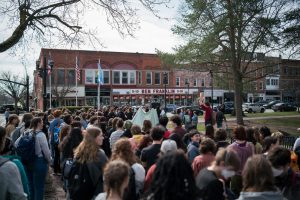Professors Form Petition to Support the Occupy Movement
September 16, 2011
As the Occupy Wall Street movement continues to spread to cities across the country and the world, four Oberlin professors are doing their part to show solidarity with the protesters. They formed an online petition to combat the portrayal of supporters of the movement as an unsophisticated, disorganized group of young students. The petition, titled “Professors Support Occupy Wall Street and Occupy Movements Everywhere,” can be accessed at: www.thepetitionsite.com/1/Professors-supporting-Occupy.
“Everybody has to put their little brick in the wall, and this is one of the things we could do,” said Politics Professor Marc Blecher.
Blecher, along with the Chair of Latin American Studies department Steve Volk, Chair of the Russian and East European Studies department Steve Crowley and Politics Professor Chris Howell, formed the petition at the request of Sam Jewler. OC ’10. Jewler has been working with the Occupy D.C. protest and expressed concern to his former professors about the media’s portrayal of those involved in the movement.
“I think he was frustrated by hearing that the media in some circles was not taking the protesters seriously, saying this is just a bunch of young students, pot-smoking hippies, they are unsophisticated and don’t have any demands, they don’t really know what they want,” said Crowley. “And so we got the idea of putting together a statement that other professors could sign, and just as we did that, that day, The New York Times ran an article that said the Wall Street types call the Wall Street protestors unsophisticated and pot-smoking hippies, so we were able to send that around along with the request to sign the statement.”
The article Crowley referred to [“In Private, Wall St. Bankers Dismiss Protesters as Unsophisticated,” The New York Times, Oct. 15, 2011] quotes a “top hedge fund manager” as saying, “Most people view it as a ragtag group looking for sex, drugs and rock ’n’ roll.” While the petition generated by the Oberlin professors was not in direct response to the accusations brought forth in the Times article, the overlap indicates that Jewler’s concerns were not unfounded and that there is a stereotype attached to the Occupy movement.
According to the sponsors of the petition, these stereotypes carry no validity. Volk says the movement is “what so many of us have been waiting for — a visual way that [lets] people know that the majority of us are pretty tired with what’s going on.” The petition itself reveals that the negative media portrayals of the protesters are uncorroborated; it grew quickly in professor signatures in the first few days and has now slowed down at just fewer than 2,000 signatures.
The sponsors are hoping to find new ways to bring attention to the petition and gain more support. Blecher and Crowley highlight big name signers of the petition, such as Noam Chomsky and Frances Fox Piven, and say that they hope to have more well-known professors sign the petition in order to attract even more attention. Blecher says that the appearance of signature 287, Noam Chomsky, encouraged Jewler and his counterparts to continue checking that each signature is real and legitimate.
The four sponsors of the petition vary in their political analysis of the Occupy movement and where they see it heading. The debate over whether or not the protest should set forth a specific set of demands or root itself institutionally calls forth differing responses. Blecher says he is perfectly happy with the movement not making demands.
“When you make demands, then you can fail to get your demands, [and] now you’ve lost. Now you’re a loser and yesterday’s story,” said Blecher.
Howell believes that the Occupy movement is effective because it has created a national conversation about the disparity the wealthiest 1 percent of Americans who now own roughly 40 percent of the nation’s wealth and the remaining 99 percent. He does not, however, think the movement will ultimately bring about “lasting social change.” In order for that to occur says Howell, it would have to transform into institutions, which he does not foresee that happening. Nonetheless, he appreciates the broader issues the Occupy movement brings forth, such as the need for a “radical extension of democracy” and a reformation of the capitalist system.
“I think for most of Occupy Wall Street, capitalism itself is not the target. The target is a political system that does not regulate that capitalism properly. Now if you ask me what the root cause is, I’m going to say absolutely it’s capitalism because it is simply intellectually incoherent to believe you can have a democratic system in a hugely class divided society. It’s not possible,” said Howell.
Volk disagrees with his colleague about the long-term effect the Occupy movement will have. He believes that, contrary to what the media and the movement’s opponents have suggested, at least a small group of protestors will continue to occupy throughout the winter months and that the movement will be able to transform itself to continue in a different context.
“There will be a determined core that will stick it out all winter long, and I also think they’re smart enough to figure out how to keep it going without necessarily camping out. There’s no reason other than symbolic why they have to occupy that space when what they’re occupying is politics,” said Volk. “That politics will go on at a large level, and the space will continue to be occupied by people who believe in it.”

























